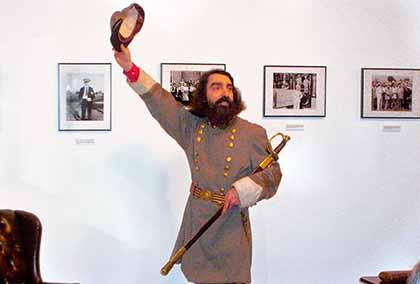By the Greater Astoria Historical Society
The Greater Astoria Historical Society kicked off a series of events Tuesday that will commemorate the 150th anniversary of the Civil War over the next five years with a presentation by actor and performing historian Patrick Falci.
Falci, who lives in Rosedale, has been playing Confederate Gen. A.P. Hill for years, appeared in the 1993 film “Gettysburg” and served as historical adviser for its 2003 prequel “Gods & Generals.” Although not as well known as Confederate heroes like “Stonewall” Jackson, A.P. Hill was one of the most prominent and successful division commanders of Gen. Robert E. Lee’s famed Army of Northern Virginia.
Falci, who grew up in Astoria, recalls that he was drawn to the character of Hill from an early age when he read of him in the “American Heritage Golden Book of the Civil War,” published in 1961.
He began by asking the audience to raise their hands if they had brothers and sisters or sons and daughters. As hands went up across the room, Falci continued: “Ever had a fight or difference of opinion?”
He then explained that from the Southern states’ perspective, they had voluntarily joined the Union and thereby believed they had a right to secede from it as well. The first states to secede were South Carolina, Mississippi, Florida, Alabama, Georgia, Louisiana and Texas.
Falci recounted how the 34-hour bombardment of Fort Sumter April 12-13, 1861, had resulted in no deaths but the 100-gun salute to the American flag ordered by commander Major Robert Anderson, as a condition of surrender, did lead to the first fatality of the Civil War.
After the bombardment of Fort Sumter, President Abraham Lincoln called for 75,000 volunteers to suppress the rebellion, which caused Virginia, Arkansas, Tennessee and North Carolina to leave the Union as well.
Falci asked the gathering at the society’s headquarters to come up with reasons why young men from both the North and South would want to go to war. People responded for the money, clothes and regular meals, patriotism, desire for adventure, anti-slavery (in the case of the North) and a desire to preserve their way of life (in the case of the South).
Almost everyone in both the North and South believed the war would be over in a matter of months, so early enlistments were only for 90 days. By the end of July 1861, the term of these enlistments would be up. Falci told his listeners that, as a result, Lincoln had to push his untried “rookies” into battle post haste.
The first big battle of the Civil War took place July 21, 1861, near a creek in northern Virginia called Bull Run and the town of Manassas Junction, only 25 miles south of Washington, D.C. Falci noted that throughout the war, the North would name battles according to the nearest waterway while the South would use the nearest town or city as their point of reference.
This first engagement had a surreal quality with a number of civilians coming down from Washington with picnic baskets to observe the goings-on. Though the battle went well for the Union at first, Confederate reinforcements soon arrived by rail — a new development in warfare — and turned the tide for the South. Bull Run also gave the war its first hero in the form of Gen. Thomas “Stonewall” Jackson, whose troops held a key part of the Confederate line while other units were retreating.
Falci described what conditions were like for the average soldier during the war, noting that most actually died from disease and only got a chance to bathe four times a year on average. He showed the audience the different types of headgear and clothing the troops wore, the progression of flags used by the South and how to load and fire the British-manufactured Enfield rifle-musket used by both sides during the war.
Falci pointed to three factors that helped lead to the defeat of the Confederacy: the 1863 Emancipation Proclamation, which transformed the war into a moral crusade against slavery; the subsequent enlistment of 180,000 black Americans into the Union Army, which Lincoln himself said was critical to winning the war; and the appointment of Ulysses S. Grant to supreme command of the Northern army.
Falci concluded his presentation by sharing his view that it is important to remember our history and preserve Civil War battlefields like Gettysburg, which are often under assault from real estate developers and others who would like to use the land for commercial purposes.



































